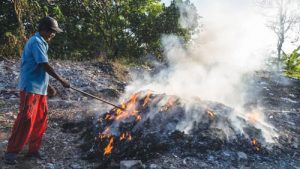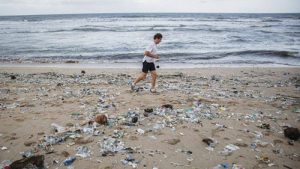Bali leads the way and officially bans single-use plastic bags, straws and polystyrene across the island
 On January 1, 2019, Rai Mantra, the Mayor of Denpasar announced Bali’s capital would ban single-use plastic bags in supermarkets, convenience stores and shopping centres. Now, six-months later, the ban has been officially extended across the island under something called Pergub Bali No. 97/2018 to include everyone from modern retailers to traditional markets in cities, towns and villages.
On January 1, 2019, Rai Mantra, the Mayor of Denpasar announced Bali’s capital would ban single-use plastic bags in supermarkets, convenience stores and shopping centres. Now, six-months later, the ban has been officially extended across the island under something called Pergub Bali No. 97/2018 to include everyone from modern retailers to traditional markets in cities, towns and villages.
Bye Bye Plastic Bags
According to a recent article published by Gapura Bali, much of the credit for Bali’s war against single-use plastics “has to go to Melati and Isabel Wijsen, the sisters responsible for the Bye-Bye Plastic Bags (BBPB) campaign in Bali” and their team of dedicated souls who have been on the front-line for a plastic free Bali for over five years, but the movement is global in scale.
The Seminyak Times, reporting on data released by System IQ, claim the Bali Partnership, in collaboration with Governor Koster’s Waste Management Task Force, the provincial Environmental Agency (DLH) and the Norwegian Ministry of Foreign Affairs, have been working “on a comprehensive plan to end plastic pollution from the island” in support of “Indonesia’s National Action Plan on Marine Plastic Debris, a commitment to reduce ocean plastics by 70-percent by 2025.”
Efficiently managing waste
According to their report “just over 48-percent of waste generated in Bali is managed responsibly, either through recycling or landfill, while the rest is burned or pollutes land, waterways and the ocean. As a result, 33,000-tons of Bali’s plastic waste ends up in the ocean each year.”
For visitors and locals alike, the horrifying proof of this has been afflicting Bali’s most popular beaches in recent years, something, which prompted the local government to declare a ‘Garbage Emergency’ in 2017.
The impact tourism has on Bali is a double-edged sword. On the one hand the tourism industry is the lifeblood of the island’s economy while on the other, tourists produce more than three-times the amount of trash than local residents on a daily basis. Education and awareness are key factors in addressing the problem.
Sustainable and eco-travel trends
The tourism industry is usually quick to identify market trends and the issue of single-use plastics is one that has gained momentum in recent years, evidenced by more and more people travelling to destinations where positive environmental efforts are being made. Booking.com’s Global Travelers Report for 2019 has found 55-percent of global travelers are more determined to make sustainable travel choices and 72-percent believe people need to act now and make sustainable travel choices to save the planet for future generations.
The latest ban in Bali is already being welcomed by some of the island’s leading international and local hotel brands. What’s New Indonesia spoke with The Westin Resort, Renaissance Bali Uluwatu, The Stones Legian and Padma Hotels who have been implementing environmentally friendly and sustainable initiatives and they welcome the latest island-wide ban.
Can Bali be a model for the world?
These and other properties have been conducting regular cleanup campaigns bringing “tourists, volunteer groups, hotels and local authorities,” together say Singapore’s The Straits Times, with the intention to create a model the rest of the world will follow. According to The Seminyak Times “more than 400-community, private-sector, government and cultural and religious organizations are active in cleanups, education, waste collection and recycling.”
The Straits Times goes on to quote Ida Bagus Mandhara Brasika from the Bali Governor’s Waste Management Task Force as saying “what happens in Bali will always be noticed by the world. In Bali we are now at the right moment to stop our ocean leakage … we’ll start from Bali and the impact will be global.”
Significant support from the Norwegian government will go a long way to achieving this. Local newswires are reporting Bjørnar Dahl Hotvedt, Norway’s Charge d’Affaires to Indonesia as suggesting “contributing to local solutions and working closely with local leadership in Indonesia, with the aim of ending the global challenge of ocean plastics, is a priority for the Norwegian government.”
Bali’s trash at a glance
The results of the report from the Waste Management Task Force, the Provincial Environmental Agency (DLH) and the Norwegian Ministry of Foreign Affairs found:
Bali generates about 1.6-million tonnes of waste each year.
Around 303,000-tonnes of that waste is plastic. Some 33,000-tonnes of plastic waste leaks into Bali’s waterways every year. Indonesian and international tourists generate more than three times the waste of Bali’s residents. Bali has 10-official landfills, which handle around 48-percent of the island’s waste. Only around 7-percent of Bali’s plastic waste is collected for recycling Bali residents are ready for change. 87-percent are willing to sort waste and are ready to make the effort to reduce, reuse and recycle. [gapurabali.com June 25, 2019]
Aussie mum let son get ‘tattoo’ that left him with CHEMICAL BURNS
An outraged mother who let her five-year-old son get a temporary tattoo in Bali has issued a warning to other parents after the ink left him with a chemical burn. Louise Byrne said she was over the moon after she and her husband Jesse touched down in Bali, Indonesia, on May 27 with their three kids Ella, seven, Logan, five, and Heidi, one. The 37-year-old stay at home mum from Perth said it was her family’s first time visiting the popular holiday destination and so she and her husband were not sure what to expect. . ‘We’ve never been to Bali before, so we decided to go with some friends on a week-long holiday,’ Louise said.
after the ink left him with a chemical burn. Louise Byrne said she was over the moon after she and her husband Jesse touched down in Bali, Indonesia, on May 27 with their three kids Ella, seven, Logan, five, and Heidi, one. The 37-year-old stay at home mum from Perth said it was her family’s first time visiting the popular holiday destination and so she and her husband were not sure what to expect. . ‘We’ve never been to Bali before, so we decided to go with some friends on a week-long holiday,’ Louise said.
On the third day of their trip, the couple’s son Logan was approached by a local Balinese beach vendor who offered to give the child a temporary ‘henna’ tattoo for five Australian dollars. After seeing other tourists get similar tattoos done, Louise said she did not think much of it. ‘He was really happy with it and it was all fine. After we flew home, the tattoo faded and that’s when the horrible reaction came out.’ ‘Logan woke up and said his arm was sore, and it was really itchy hot, burning. I couldn’t believe what had happened.’
Distraught mum Louise took her son to the doctor who said Logan was suffering a chemical burn from the dye and was prescribed cortisone cream to help the dermatitis. But Louise said she is worried the burn might never heal and that Logan could be left with permanent scarring. Now the mum is sharing her story to warn other parents about the potential dangers of getting temporary tattoos while on holiday. ‘I’ve heard they can go away after a few years but sometimes they’ll scar forever. Only time will tell, but hopefully it will heal up completely.’
The Australian Department of Foreign Affairs and Trade advises travellers to avoid temporary black henna tattoos while overseas, stating that they ‘often contain a dye which can cause serious skin reactions’. Dr Adrian Lim, a fellow at the Australasian College of Dermatologists, said: ‘You can get an allergic reaction to henna tattoos especially when they use the black dye. ‘It is typically the same one that’s used in hair dye. The culprit is the para-phenylenediamine or PPD. Some people can get quite a strong allergic reaction to this.’
‘It can take 7-10 days for a reaction to occur. The reactions can be intense. In extreme cases, people can run into problems with scarring.’ [dailymail.co.uk June 19, 2019]
Bali ban on plastic bags survives court challenge
 Bali’s proposed island-wide ban on plastic bags and straws will go ahead after an Indonesian court rejected a challenge by the country’s plastics recycling industry. The Indonesian Plastic Recyclers Association lodged a Supreme Court bid last month to block the ban, which will come into force next month, arguing it was discriminatory and violated human rights. Lawyers for ADUPI had argued the ban would hurt its members – plastic bag manufacturers and recyclers – and Balinese scavengers who survive on what they make from collecting the waste. Bali Governor Wayan Koster said ADUPI’s bid to block the ban had failed but said the court had not yet published its reasons. “We are already implementing the regulation now. The next step is to work on monitoring its implementation,” Mr Koster told The Australian.
Bali’s proposed island-wide ban on plastic bags and straws will go ahead after an Indonesian court rejected a challenge by the country’s plastics recycling industry. The Indonesian Plastic Recyclers Association lodged a Supreme Court bid last month to block the ban, which will come into force next month, arguing it was discriminatory and violated human rights. Lawyers for ADUPI had argued the ban would hurt its members – plastic bag manufacturers and recyclers – and Balinese scavengers who survive on what they make from collecting the waste. Bali Governor Wayan Koster said ADUPI’s bid to block the ban had failed but said the court had not yet published its reasons. “We are already implementing the regulation now. The next step is to work on monitoring its implementation,” Mr Koster told The Australian.
The decision comes amid an intensifying focus across Southeast Asia on plastic waste, and the thousands of tonnes shipped legally and illegally from industrialised nations since China closed its doors to the waste trade last year. Indonesia, Malaysia and The Philippines have vowed in recent weeks to return cargo containers of foreign plastic household waste – including those exported from Australia – they say were smuggled into their countries mislabelled as recyclable material.
The Bali government announced last December its intention to enforce an island-wide ban on single-use plastic bags, straws and Styrofoam to tackle an issue threatening not only the island’s critical tourist industry but also public health. ADUPI’s bid to block that ban was one of seven petitions planned by the Indonesian plastics industry, including four in Kalimantan, home to some of the world’s most diverse rainforests and several critically endangered species. ADUPI director Christine Halim said she had not yet been formally advised the petition had failed but the object of the challenge had been to highlight the failure of governments’ to management waste well. “The most important thing was not to win or lose but to convince the government that (plastic bag) bans are not the solution,” she said. “The solution is to repair our waste management practices and educate the population about how to dispose of waste, especially plastic waste. We have talked so many times to government but they don’t listen to ideas on how better to collect waste.”
Indonesia is the world’s second-largest contributor of plastic pollutants in the oceans after China, and four of its rivers rank among the world’s 20 most polluted. Yet local recyclers say they are forced to import foreign plastic waste because there is no reliable domestic supply of recyclable plastics. Just 9 per cent of all plastics in Indonesia are recycled. [The Australian June 15, 2019]
Bali pledges to reduce ocean plastic gains traction
A Norway-backed organisation hopes its efforts to end plastic pollution in Bali will gain impetus after a study revealed that more than half of the rubbish produced on the Indonesian island is burned or dumped. Only 48 per cent of waste generated in Bali is managed responsibly either through recycling or landfill, according to a five-month research project by The Bali Partnership. The island’s waste managements sector has struggled to keep pace with rapid development and tourism, the organisation said.
that more than half of the rubbish produced on the Indonesian island is burned or dumped. Only 48 per cent of waste generated in Bali is managed responsibly either through recycling or landfill, according to a five-month research project by The Bali Partnership. The island’s waste managements sector has struggled to keep pace with rapid development and tourism, the organisation said.
Bali attracts some 6.5 million international tourists each year and rubbish regularly washes up onto its once-pristine beaches. Tourists are significant contributors to the problem, generating 3.5 times more waste per day than Bali residents, according to the research. Supported by the Norwegian Ministry of Foreign Affairs, the new organisation – which unites Indonesia’s central and local governments, academics, waste experts and businesses – supports a national commitment to reduce ocean plastics by 70 per cent by 2025.
Ida Bagus Mandhara Brasika of the Bali Governor’s Waste Management Task Force said he is optimistic the Bali Partnership can help reduce Bali’s waste problem and spur action on plastics in oceans internationally. “The island of Bali is small but its significance is big. What happens in Bali will always be noticed by the world. In Bali we are now at the right moment to stop our ocean leakage. We start from Bali and the impact will be global.”
Of the 1.6 million tonnes of waste produced by residents, tourists and businesses each year in Bali, 303,000 tonnes is plastic, the research found. Some 33,000 tonnes of plastic leak into rivers and the ocean and just seven per cent of Bali’s waste is collected for recycling. Tourists generate 3.5 times as much rubbish as Bali residents, the research found. The Bali Project hopes the government will use the research’s findings to improve waste management and deal with plastics in the ocean. “Now we have comprehensive data to support the governments’ commitment to reduce plastics by 2025,” Gede Hendrawan, a professor at Bali’s Udayana University who led the research, told Reuters. Two years ago, the government pledged up to US$1 billion (NZ$1.5 billion) to reduce ocean waste by 70 per cent by 2025. The Association of South East Asian Nations is expected to adopt a Bangkok Declaration on Combating Marine Debris at a summit in Thailand, starting on June 27. [www.stuff.co June 24,2019]